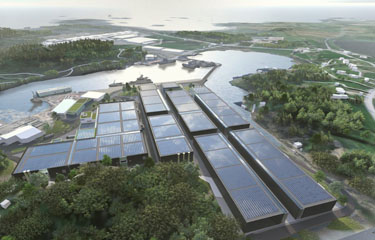As the Norwegian salmon-farming community increasingly turns towards land-based aquaculture using flowthrough, recirculating aquaculture systems (RAS), or hybrid systems, the emphasis is on volume production, to achieve the economies of scale necessary to make operations profitable. Andfjord Salmon, for example, is building out a farm in Kvalnes, Andøya, Norway with the potential to produce 90,000 metric tons (MT) of head-on, gutted salmon at full capacity.
Another Norwegian project with a big goal for production is Salmon Evolution, which aims to harvest 70,000 tonnes HOG per year by 2030 and has signed a term sheet with Dongwon Industries to build a farm in South Korea and collaborate on additional international expansion, plus sales and marketing tie-ups.
Quality Salmon, financed by Norway-based Lighthouse Capital, plans to produce up to 100,000 MT of land-based salmon just over the Norwegian border in Sweden, in two 40,000 MT and one 20,000 MT RAS facilities. These will be part of an ambitious wider integrated circular economy project that includes feed and processing plants, a byproducts biorefinery, wastewater treatment facility, solar energy plant, and support services. During a press conference to launch the project in 2021, Lighthouse Finance Owner and CEO Roy Høiås said it would “pave the ground for the highest salmon quality and lowest operating cost the market has seen in high-volume production.”
In Espevik, Norway, Ecofisk aims to produce post-smolt and harvest size salmon at a 300,000-square-meter production site and has obtained a licence to produce 40,000 MT of fish per year. The company recently signed an agreement with Benchmark Genetics for supply of 25 million ova annually, once the project is fully developed. The first intake is expected in Q1 2023.
Gigante Salmon, part of the Gigante Havbruk Group, has its first land-based flow-through production facility under construction on Lille Indre Rosøy, Norway, with a second facility under consideration at a separate location. Introduction of the first smolts is planned for the second half of 2023 and the site has a permit for the production of 13,731 MT per year.
Other entrants into Norway’s land-based salmon-farming scene include Gaia Salmon, SalmoTerra, Eco Seafood, and Ljungdahls Fast.
Two of the latest companies to join the push to build larger land-based aquaculture projects in Norway are Baring AS subsidiary Baring Farsund and Alsaker Fjordbruk, which is already a major salmon producer.
Baring Farsund recently obtained a licence to build a 24,000-MT land-based facility for post-smolt and harvest-ready fish in Farsund, in the far south of Norway. The 80,000-square-meter facility will be the region’s largest land-based fish farm. According to a company press release, work on the project will begin in the next few months. The company said they have a plan to recycle 99.5 percent of the seawater the farm uses and to obtain 100 percent of the energy it needs to operate from renewable wind, water, and solar sources.
“We have worked for several years on our fish-farming plans and have had a good dialogue with the local authorities throughout the process. We are thrilled to obtain the licences and look forward to starting construction,” Baring Farsund Chairman Roald Reme said.
Alsaker Fjordbruk is applying for a license to build a land-based RAS facility in an industrial area 70 kilometers south of Bergen, according to an announcement from Tysnes municipality. The farm will use seawater and desalinated seawater to produce harvest-ready fish and post-smolt fish for transfer to sea at weights between 1 and 2.7 kilograms. According to the announcement, Alsaker hopes the fish farm will become one of the world’s largest land-based systems, and enable the company to almost quadruple its current production volume of salmon, up to 100,000 MT.
Overall, the land-based aquaculture sector has seen increased investor confidence, though troubles experienced by a few larger players – most notably Atlantic Sapphire – have resulted in some level of pullback in investor interest. Advocates for land-based salmon farms argue that they answers a number of criticisms leveled at the industry by environmentalists, by allowing for increased control of biological processes and water quality, reduced use of chemicals, and better control of fish pathogens, sea lice, feeding regimes and fish health, while at the same time reducing or eliminating inputs into the ocean.
Photo courtesy of Baring Farsund







